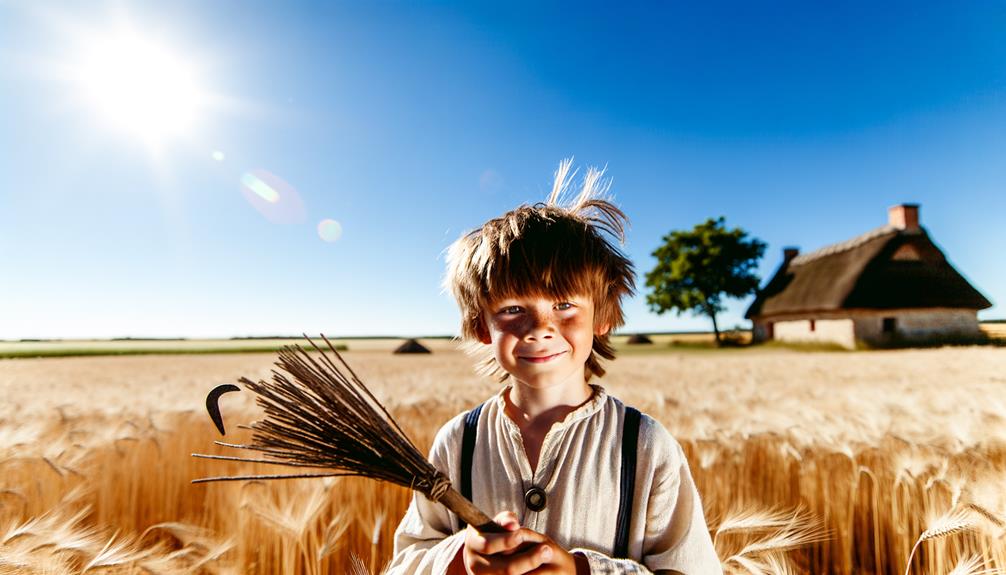Meaning of the Name Thatcher
The name Thatcher is of Anglo-Saxon origin, derived from the Old English term 'þæcere,' indicating a craftsman skilled in constructing and repairing thatched roofs. This occupation was pivotal in medieval England, providing durable and weather-resistant shelters.
The surname Thatcher, like many occupational surnames, became hereditary over time, retaining its historical roots. Thatched roofing was a prevalent architectural feature in Britain, making the trade of thatching essential for rural communities.
In contemporary times, the name evokes craftsmanship and resilience, gaining additional cultural significance from figures like Margaret Thatcher. Exploring further reveals an intricate tapestry of historical and modern connotations.

Key Takeaways
- The name Thatcher originates from the Old English word 'þæcere', meaning a craftsman specializing in thatched roofs.
- It historically signifies an occupation essential in medieval England for constructing durable, weather-resistant roofs.
- Thatcher evolved as a hereditary occupational surname through Middle English and Early Modern English periods.
- The name embodies traits of craftsmanship, resilience, and practicality due to its occupational roots.
- Popularity of the name saw a resurgence due to cultural trends and political influence, notably Margaret Thatcher.
Historical Origins
Rooted in the Anglo-Saxon tradition, the name 'Thatcher' historically derives from the Old English word 'þæcere,' which referred to a craftsman specializing in constructing and repairing thatched roofs. This term emerged during a period when thatched roofing was a prevalent architectural feature in Britain, necessitating specialized skills in straw, reed, and other natural materials.
The profession of thatching played a critical role in rural communities, ensuring homes were weatherproof and insulated. The surname 'Thatcher' hence denotes an ancestral link to this essential trade, reflecting the socio-economic structure of medieval England.
Over time, the name evolved into a hereditary surname, cementing its place within English genealogical records and preserving its historical significance for future generations.
Occupational Roots
The occupational roots of the name Thatcher are deeply embedded in the historical significance of the traditional craft of thatching, which involved constructing roofs using straw or reeds.
This profession was crucial in pre-industrial societies, providing durable and weather-resistant shelter.
The etymology of the name has evolved from the Old English ‘þæcere,’ reflecting the occupation’s prevalence and importance in medieval England. The role of the heather name meaning was highly esteemed during this time, as the acre was the basic unit of agricultural production and the primary source of wealth for landowners. As a result, the title of “aecer” was a respected and prestigious occupation. Over time, the spelling and pronunciation of the name evolved, eventually becoming the surname that we recognize today.
Historical Job Significance
Emerging from the bygone eras of medieval England, the name Thatcher is intrinsically linked to the occupation of thatching, a skilled trade involving the construction and repair of roofs using materials such as straw, reed, or heather.
This occupation held significant importance in rural communities, providing important shelter that was both durable and weather-resistant. Thatchers were crucial craftsmen, ensuring that homes and barns remained habitable and protected from the elements.
Their expertise extended beyond mere functionality; they contributed to the aesthetic and cultural landscape of the period. The prevalence of thatched roofs in historical architecture underscores the crucial role these artisans played.
Therefore, the name Thatcher not only reflects an occupation but also a critical component of medieval societal infrastructure.
Etymological Evolution
Tracing its origins to the Old English term 'þæcere,' which translates to 'roof thatcher,' the name Thatcher has evolved through centuries of linguistic and occupational shifts. Initially, it denoted individuals specializing in covering roofs with thatch, a skill critical for medieval architecture. Over time, occupational surnames like Thatcher became hereditary, reflecting family trades. This evolution underscores the interplay between language and social structure.
| Period | Language | Meaning |
|---|---|---|
| Medieval | Old English | Roof Thatcher |
| Post-Norman | Middle English | Roofer/Craftsman |
| Early Modern | Early Modern Eng | Roofing Specialist |
| Contemporary | Modern English | Historical Surname |
This table illustrates the semantic shifts and linguistic progression of the name Thatcher, mirroring broader historical changes.
Linguistic Evolution
Examining the linguistic evolution of the name Thatcher reveals its origins in Old English, where it denoted an occupation related to roofing with thatch. This term, stemming from the Old English word 'þæc' (thatch), evolved through the centuries due to linguistic shifts and socio-economic changes.
The name underwent significant transformations:
- Middle English Period: The Old English 'þæcere' morphed into 'thatcher,' influenced by Norman linguistic patterns post-1066.
- Standardization in the Early Modern English Period: The name 'Thatcher' became standardized in spelling and usage, reflecting broader trends in English orthography.
- Contemporary Usage: Today, 'Thatcher' exists both as a surname and a term, retaining its historical occupational roots while being adapted into modern lexicons.
Cultural Significance
The cultural significance of the name Thatcher spans several dimensions, beginning with its historical roots in English craftsmanship, where it referred to individuals who constructed thatched roofs.
Politically, the name gained prominence through the legacy of Margaret Thatcher, the first female Prime Minister of the United Kingdom, which imbued it with connotations of leadership and conservative politics.
In contemporary society, the name continues to evoke both its artisan origins and its political associations, leading to varied modern interpretations.
Historical Roots Explored
Rooted in Old English, the name Thatcher holds significant cultural importance, historically denoting individuals who specialized in the craft of thatching roofs—an essential trade in medieval England.
Thatching involved the meticulous layering of straw or reeds to create durable, weather-resistant roofs, a skill highly valued in communities reliant on agrarian economies.
The name Thatcher thus embodies a rich heritage linked to craftsmanship and rural life.
To better understand the historical significance of the name, consider the following:
- Medieval Economy: Thatchers were integral to maintaining homes and buildings, ensuring shelters were habitable.
- Social Status: Skilled thatchers held respected positions within their communities.
- Architectural Heritage: Thatching techniques contributed to the unique architectural landscape of medieval England.
Political Associations Noted
In the domain of political history, the name Thatcher evokes the legacy of Margaret Thatcher, the first female Prime Minister of the United Kingdom, whose tenure from 1979 to 1990 marked a transformative period in British politics.
Her policies, often described as Thatcherism, emphasized deregulation, privatization of state-owned industries, and reducing the power and influence of trade unions. This era saw significant economic reforms that aimed to curb inflation and stimulate growth, albeit with controversial social costs.
Thatcher's leadership style, characterized by decisiveness and strong convictions, earned her the nickname 'The Iron Lady.' Her influence extended beyond the UK, impacting global economic policies and contributing to the ideological shift towards neoliberalism in the late 20th century.
Modern Interpretations Analyzed
While Margaret Thatcher's political legacy is well-documented, modern interpretations of the name Thatcher extend into cultural spheres, where it has come to symbolize a broader ethos of resilience, determination, and ideological conviction. This evolution reflects both historical reverence and contemporary relevance, transcending mere political affiliation.
- Cultural Iconography: The name Thatcher has become synonymous with unwavering resolve, often invoked in literature and media to depict strength in the face of adversity.
- Gender Dynamics: Thatcher's role as a pioneering female leader continues to inspire discussions on gender equality and female empowerment in leadership roles.
- Economic Philosophy: The term 'Thatcherism' is frequently used to describe economic policies that emphasize free-market principles, influencing modern economic debates and practices.
These cultural dimensions illustrate the enduring impact of the Thatcher legacy beyond politics.
Famous Namesakes
Among the most prominent individuals bearing the name Thatcher is Margaret Thatcher, who served as the Prime Minister of the United Kingdom from 1979 to 1990 and was the first woman to hold this office. Known as the 'Iron Lady,' her tenure was marked by significant economic reforms, staunch anti-communism, and a transformative reshaping of British society. Her impact on global politics and the domestic landscape of the UK cannot be overstated.
Additionally, other notable Thatchers include Denis Thatcher, her husband, who was a successful businessman, and Carol Thatcher, her daughter, a journalist and author. Together, the Thatcher family name has become synonymous with resilience, leadership, and an indelible legacy in both political and cultural spheres.
Popularity Over Time
The prominence of figures like Margaret Thatcher greatly influenced the popularity of the name Thatcher. Historically, the name saw a rise during Margaret Thatcher's tenure as the British Prime Minister from 1979 to 1990. However, its popularity waned during subsequent decades as political associations faded.
More recently, the name Thatcher has gained a resurgence, particularly in the United States, influenced by a trend towards surnames as first names.
Key factors influencing the popularity of Thatcher:
- Political Influence: Rise during Margaret Thatcher's political career.
- Cultural Trends: Decline post-1990s due to changing political landscapes.
- Modern Revival: Recent uptick in popularity as a given name in the U.S.
Modern Interpretations
In contemporary contexts, the name Thatcher is often interpreted through the lenses of historical legacy, cultural significance, and modern naming trends. Historically, the name conjures images of the profession of thatching roofs, symbolizing craftsmanship and resilience.
Culturally, it evokes the indelible impact of figures like Margaret Thatcher, the former British Prime Minister, adding layers of political and social connotations.
Modern naming trends show an increasing preference for unique, strong-sounding names, further enhancing Thatcher's appeal. The name's robust historical roots and multifaceted cultural resonance make it a distinctive choice in today's diverse naming landscape.
Its blend of tradition and contemporary relevance continues to foster its popularity, making it a name that balances the past with the present.
Personal Traits and Characteristics
Personal traits associated with the name Thatcher often include a strong sense of resilience, practicality, and leadership, reflecting its historical and cultural underpinnings. The name Thatcher is derived from the Old English term for a roof thatcher, a profession requiring not only skill but also perseverance and resourcefulness. Historically, individuals named Thatcher were seen as dependable figures within their communities, embodying characteristics essential for survival and prosperity.
The following traits are commonly linked to the name Thatcher:
- Resilience: The ability to recover quickly from difficulties is a hallmark of those bearing this name.
- Practicality: A pragmatic approach to problem-solving and daily life defines the Thatcher mindset.
- Leadership: Often seen as natural leaders, Thatchers inspire confidence and direction within their groups.
Conclusion
The name Thatcher, rooted in the occupation of roofing with thatch, has evolved linguistically and culturally over centuries. It is notable that, according to historical census data, the name peaked in popularity during the late 19th century, reflecting its occupational heritage.
Famous bearers like former British Prime Minister Margaret Thatcher have further cemented its cultural significance. Modern interpretations often associate the name with characteristics such as resilience and practicality, underscoring its enduring relevance and rich historical tapestry.






